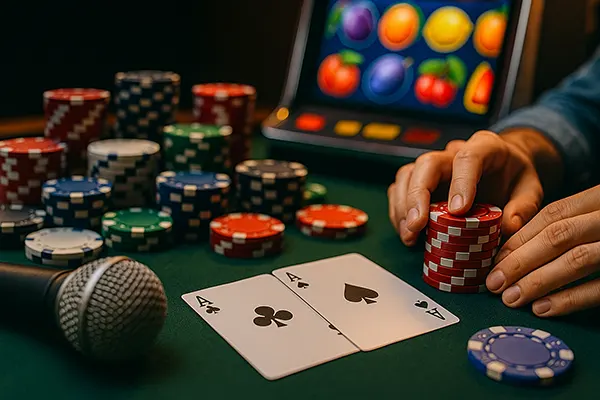Gambling and Stand-up: How Comedians Joke About Casinos, Bets and Players

Comedians have always drawn material from everyday human experiences, and gambling — with its emotional highs, financial lows, and cultural presence — is a goldmine for stand-up routines. From late-night poker games to spinning slot reels and the chaos of bonus rounds, stand-up comedy reflects how society views gambling — often with a blend of humour and discomfort. But behind the laughter lies a deeper societal commentary: how people relate to risk, reward, and their own limits.
The Comedy of Chance: Why Gambling Is a Popular Theme
Gambling resonates deeply because it embodies tension, hope, and disappointment — fertile ground for comedy. Many comedians use casinos, slot machines, and betting tales to highlight human irrationality. When someone places a bet on a horse because they “liked the name,” it instantly becomes a relatable punchline about decision-making gone rogue.
Popular stand-up acts often feature bits about roulette tables and blackjack blunders, as these settings naturally invite absurdity. The unpredictability of outcomes, combined with overconfidence or superstition, creates comic tension that is easy to exaggerate on stage. Audiences laugh not just at the stories but because they recognise parts of themselves in them.
Furthermore, casinos and gambling halls are filled with characters — high rollers, desperate punters, bizarre staff — that practically write their own sketches. The colourful atmosphere gives comedians endless material without needing to invent too much. It’s not the industry but the psychology of those involved that makes gambling such a punchline-rich zone.
Slots, Bonus Madness and the Comedic Appeal
Slot machines are particularly common in comedy because they’re often portrayed as symbols of mindless optimism. Jokes about people sitting for hours, hypnotised by flashing lights and sounds, tap into a shared cultural experience of watching someone ‘lose slowly’. It’s passive gambling at its most absurd — perfect for satire.
Bonus rounds in slots, especially the ones with over-the-top animations and fake celebratory music, are another comedic gem. Comedians ridicule the fact that a flashing “YOU WIN!” sign often means the player won €0.30 after spending €1.50. This cognitive dissonance — between what the machine promises and what it delivers — is ripe for mockery.
The repetition and ritualistic nature of slots lend themselves to stand-up routines that explore obsession, boredom, and hope. They also allow performers to act out physical comedy: imitating spinning reels, fake joy, and the resigned slump after a “near win.”
Humour as a Mirror: What Jokes About Gambling Reveal
Humour often works as a social mirror, and gambling jokes reveal much about our attitudes toward risk, wealth, and control. They expose contradictions — like people who claim to be unlucky yet spend hours chasing jackpots. In doing so, comedians unpack the delusions and justifications that players often use.
Many routines subtly critique not just individual gamblers but societal attitudes that romanticise winning big. They mock the idea of “making it big” through luck rather than effort, highlighting how unrealistic and often tragic that hope becomes. Laughing at these notions allows audiences to process the tension between fantasy and reality.
There’s also a cathartic element: jokes about losing money, chasing bonuses, or betting recklessly allow people to laugh at their own past decisions. It can serve as a soft intervention — humour as a safe way to reflect without moralising.
The Role of Satire in Addressing Gambling Harm
Some comedians go beyond light teasing and enter the realm of satire to address problem gambling and addiction. These routines may include dark humour about pawned items, lost relationships, or self-deception. When done well, they don’t ridicule the addict but highlight the societal structures and marketing tactics that feed compulsive gambling.
Stand-up routines that tackle the darker sides of gambling challenge the audience to think. Instead of selling dreams, they expose the mechanisms that keep people playing — from misleading advertising to the psychological tricks used in game design. Here, comedy becomes a tool for awareness, not just entertainment.
While these jokes can be uncomfortable, they’re necessary. They allow for conversations that might otherwise be avoided. By bringing taboo topics into the spotlight with humour, comedians perform a kind of social service — turning silence into dialogue through laughter.

From Vegas to Open Mics: Global Influence and Local Stories
Although Las Vegas is the symbol of gambling excess, stand-up comics worldwide share stories of scratch cards, horse racing, and online bets. These tales adapt to local cultures but carry universal themes: hope, loss, bravado, and regret. British comedians, for instance, often use dry wit and self-deprecation to talk about betting failures.
In Eastern Europe, many comics mix social commentary with gambling tales, pointing out economic struggles that make people more vulnerable to get-rich-quick dreams. These performances often link gambling to broader societal problems — like poverty or lack of social mobility — giving their jokes added weight.
In Asia and Latin America, gambling humour varies from slapstick to subtle satire, but the core emotions are similar. Regardless of country, the person who believes they have a ‘system’ to beat the game is an endless source of amusement. And yet, behind the laughter often lies a silent nod of recognition.
Real Experiences Shaping Comedic Voices
Many comedians include personal gambling stories in their sets — not out of moral obligation, but because it connects with audiences. Whether it’s losing rent money at the track or misunderstanding poker rules, real-life anecdotes lend authenticity and relatability. These moments remind us that comedians are observers, but also participants.
In some cases, performers use humour to process past struggles with gambling. Rather than glorify the lifestyle, they highlight its absurdity, regrets, and lessons. The rawness of these stories can be powerful, often leaving a stronger impact than dry warnings or statistics.
What makes these routines work is not the outcome of the bet, but the human emotions behind them: hope, denial, desperation, and, eventually, clarity. Comedy here is not just relief — it’s revelation.
